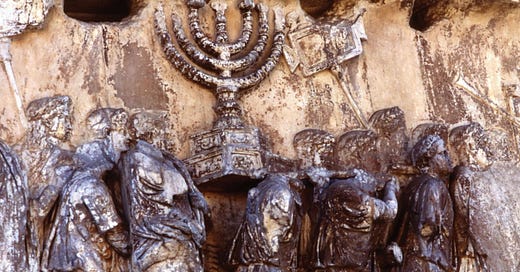1. “The war of the Jews against the Romans was the greatest of our time; greater too, perhaps, than any recorded struggle, whether between cities or nations.” — Flavius Josephus, The Jewish War, Chapter 1
2. “...those of eyewitnesses have been falsified either to flatter the Romans or to vilify the Jews, eulogy or abuse being substituted for factual record.” — Flavius Josephus, The Jewish War, Chapter 1
3. “I have decided to translate into Greek the books which I wrote some time ago in my native language for circulation among non-Greek speakers inland.” — Flavius Josephus, The Jewish War, Chapter 1
4. “For, they wish to establish the greatness of the Romans while all the time disparaging and deriding the actions of the Jews.” — Flavius Josephus, The Jewish War, Chapter 1
5. “For throughout the war he pitied the common people, who were helpless against the partisans; and, over and over again, he delayed the capture of the city and prolonged the siege in the hope that the ringleaders would submit.” — Flavius Josephus, The Jewish War, Chapter 1
6. “For it so happened that, of all the cities under Roman rule, our own reached the highest summit of prosperity, and in turn fell into the lowest depths of misery; the misfortunes of all other races since the beginning of history, compared with those of the Jews, seem small; and for our misfortunes, we have only ourselves to blame.” — Flavius Josephus, The Jewish War, Chapter 1
7. “Though their own flow of words is greater, their historical sense is inferior.” — Flavius Josephus, The Jewish War, Chapter 1
8. “...only the grief is the writer's.” — Flavius Josephus, The Jewish War, Chapter 1
9. “However, when, Epiphanes again invaded the country he counter-attacked vigorously and drove him back; then striking while the iron was hot, he hurled himself against the garrison of the City...” — Flavius Josephus, The Jewish War, Chapter 2
10. “To his brother the tragedy was a presage of the final issue.” — Flavius Josephus, The Jewish War, Chapter 2
11. “He showed a young man’s vigour in his conduct of the campaign; he sent his sons ahead with his stoutest men, while he himself at the head of a section of his army took the offensive in another direction.” — Flavius Josephus, The Jewish War, Chapter 2
12. “Time and again, when the Temple was being captured and they were being butchered round the altar, did they abandon the ceremonies, ordained for the day.” — Flavius Josephus, The Jewish War, Chapter 2



